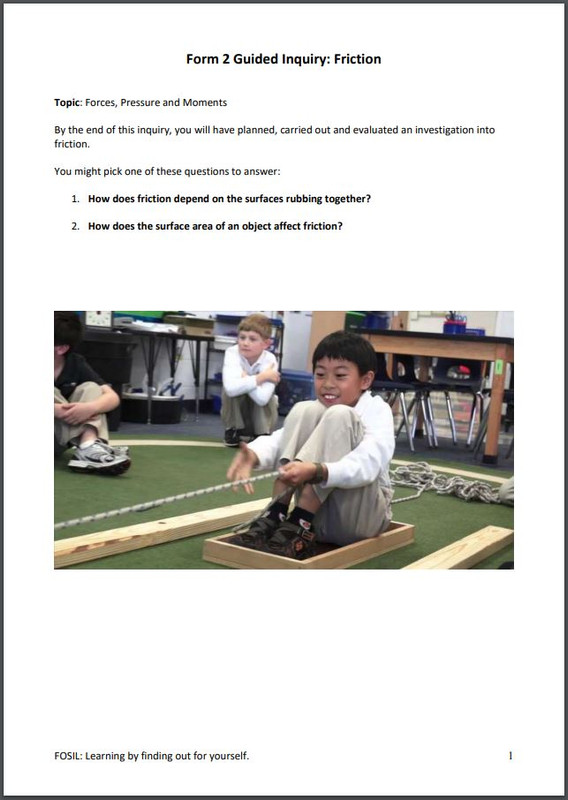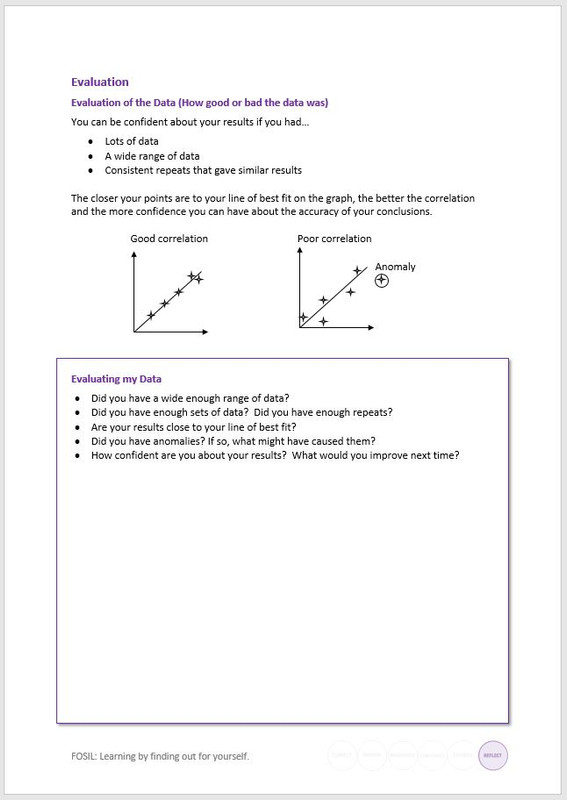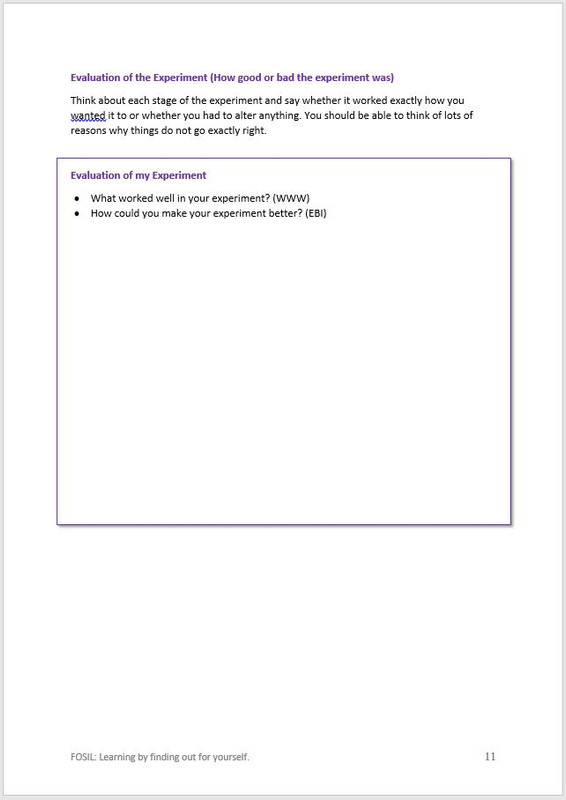Chris Foster
Active 4 years, 11 months agoRole: Head of Student Research
Town/City: Oakham
Country: United Kingdom
Forum Replies Created
-
AuthorPosts
-
Darryl, I’ve read through the F3 ISP posts and I’m very excited to read The Machine Stops! To me, this looks much more immediately relevant and accessible than the battlefields link.
It seems to me that these resources illustrate really clearly what FOSIL is all about. I think another point I would like to emphasise is that they cut through the false dichotomy of skills vs knowledge. By treating the inquiry skills as a progression, and working on them throughout the school in meaningful activities such as these, our pupils are better equipped to select and use information to develop an understanding of concepts. They have access to what Michael Young calls ‘powerful knowledge’. What is more, they get to practice learning independently, skills which have been particularly important over the last few months of disrupted schooling.
It is obvious to me (from a student research point of view) that the skills the senior pupils need to cope with the demands of the IB Diploma Extended Essay, the Extended Project Qualification and other independent project work and coursework in the Sixth Form build up from the activities they meet in the Year 9 Inquiry Skills Project and earlier.
I don’t know if Alice, Darryl, Elizabeth or anyone else in the Forum can help. I’ve been thinking about the aspects of literacy pupils require to be able to successfully ‘decode’ a question in my subject (science). It seems to me that as questions in UK science examinations become increasingly wordy, the gap between those pupils who can quickly understand what a question is asking and those who can’t is widening.
This skill of decoding an exam question is subtly different to disciplinary literacy or content area literacy, I think. Is there a particular pedagogical term for it, or a body of knowledge that might help?
(Shanahan and Shanahan make the distinction between disciplinary literacy and content area literacy thus: Content area literacy focuses on study skills that can be used to help students learn from subject matter specific texts. Disciplinary literacy, in contrast, is an emphasis on the knowledge and abilities possessed by those who create, communicate, and use knowledge within the disciplines. (Shanahan, T. & Shanahan, C. (2012). What Is Disciplinary Literacy and Why Does It Matter? Topics in Language Disorders, 32 (1), pp. 7–18).
Excellent! I look forward to seeing how the project develops!
Hi Hannah. I wonder if some of the tools we have developed for the Form 3 Individual Project might be adapted to fit in this Geography inquiry? In particular, the Investigative Journal and the evaluation in the reflection stage? I’m sure you can think of some specific issues in F3 Geography that we might address, in addition to giving the pupils more practice with citing and referencing.
One thing that has become increasingly apparent in our work with sixth form (Year 12 and 13) students is that they often don’t see diagrams, images and maps as sources that require citing and referencing. It’s an issue we are addressing in our EE and EPQ training for pupils and supervisors, but as we know from the FOSIL framework, skills are best built up and developed over time. If we want pupils to use this skill in the sixth form, we need to address it earlier in school. This Form 3 project in Geography presents us with an excellent opportunity to start working on the skills needed to cite and reference images. Something for us to bear in mind as we develop the resources, Hannah.
26th June 2019 at 7:48 pm in reply to: FOSIL and the Extended Project Qualification (EPQ) [Closed. Use Extended and Higher Project Quliafications Topic] #1622For me, the FOSIL tool that has made the most difference to the quality of EPQ research at Oakham has been the investigative journal. For this reason, I thought I would share with the forum a couple of examples of the investigative journal in use. These examples are interesting because they show how how FOSIL tools can be used to support pupils in the trickier stages of an inquiry. The journal is suitable for all abilities. It scaffolds the process of constructing understanding from a source of information. The pupil who produced these was very able, and her journal shows just how deeply she engaged with the sources she selected. Frustratingly, she hasn’t included page numbers in her citation, although these were used in her final essay. She used the referencing tools in Word to produce a bibliography which followed APA 6th Edition (our preferred ‘in-house’ style) at the end of her journal.
What’s also worth noting is that these examples show an earlier draft of the investigative journal than the one we currently use. It shows how our thinking has developed. To make the inquiry process more visible, later drafts of the journal use the FOSIL colour scheme and the icons bottom left to indicate the stages of the inquiry process it draws upon. The right hand box has been simplified and a CRAAP testing prompt added to our current draft, which can be found on the resources pages.
Do post if you have any questions about use of the investigative journal or suggestions for improvements.
Attachments:
20th June 2019 at 7:38 pm in reply to: FOSIL and the Extended Project Qualification (EPQ) [Closed. Use Extended and Higher Project Quliafications Topic] #1594As Darryl suggests, FOSIL has helped us to better support the EPQ at Oakham. In particular, engaging with FOSIL has:
- enabled us to understand the EPQ process in terms of stages in an inquiry cycle,
- made it easier to develop and adapt resources that help pupils through the difficult stages of the inquiry process, and
- think about the EPQ assessment criteria and how we can better provide evidence that shows how the pupils have engaged with the process of carrying out a project.
I’ve attached an EPQ assessment framework to this post. I produced it to help me think about what resources might support the pupils and how we can use them as evidence for their engagement in the inquiry process. The framework lists the resources we use, and links the assessment statements to the FOSIL stage they fall into. The FOSIL resources are marked with an ‘F’ in the framework.
I’ve based the framework on the AQA assessment criteria, but I hope that it might be useful for those of you who are supporting pupils through EPQs with other exam boards. The Investigative Journal and CRAAP Testing Rubric have really helped pupils think about how they select and use information.
I’ll add more resources as I produce them. At the moment, I’m working on a reflection aid to help with the summary and reflection pages of the production log.
I’d be very interested in hearing what other forum members use to support the EPQ in their schools.
Attachments:
Draft 1 has been completed and sent to Nayan (Head of KS3 Science) and Jenny (librarian) for their thoughts. I didn’t set out to produce a booklet, but it has sort of ended up that way. I was rather pleased with how easily the CREST and other materials we have developed (available in the FOSIL Resources section) have been to adapt.
My aim has been to shift the purpose of the task away from the production of a final project (Express) and towards the steps involved in carrying out an inquiry in science to answer a particular question (investigate and Construct) whilst using most of the existing teaching materials. This inquiry is designed to follow on from a ‘follow the recipe’ class experiment on how friction changes as the mass of an object changes in a previous lesson, which acts as a pilot too.
One thing I’m wrestling with at the moment is where the evaluation of data and method fits into the inquiry cycle. I’m not sure whether it falls into the reflection stage or not. It either fits really well, and is a really sensible way for reflection to occur in science inquiries, or it’s a really bad fit; there is no middle ground!
I’ve uploaded my first draft of the first page and evaluation pages, which I think may change a bit before we have something ready to roll out to other Year 8 teachers.
My next stage is to act on the feedback from colleagues and to use Elizabeth Hutchinson’s template to produce an overview of the resource and where it fits in to the topic.



Attachments:
25th April 2019 at 2:04 pm in reply to: Understanding inquiry learning | National Library of New Zealand #1143The NLoNZ introduction is very useful overview for schools, Darryl. It’s also helped me to clarify in my own mind the difference between a guided and a controlled inquiry.
Darryl, here is the ‘map is not the territory’ reference (Korzybski, 1994, p. 58).
Korzybski, A. (1994). Science and Sanity: An Introduction to Non-Aristotelian Systems and General Semantics (5th ed.). New York: Institute of General Semantics.
Thank you, Elizabeth. That’s really helpful. As a science teacher by training, it is really helpful to see case study materials outside one’s own academic discipline as the structure is more apparent, and the content is less distracting. I’ll post some of my own once I’ve worked them up using your format.
I’m Chris, and I have been Head of Student Research at Oakham School since 2018. My role involves assisting pupil and staff with EPQs and IB Extended Essays as well as other extended inquiry projects. I’ve been a teacher for over twenty years, run a boarding house and an academic department and taught Chemistry at state and independent schools, both day and boarding, mixed and single sex.
I’m actively involved in my own practitioner research too, as I am reading for a part-time PhD at the University of Cambridge as well as teaching full time at Oakham. My research interests fall broadly into the sociology of education and I am particularly interested in perceptions of teacher professionalism and identity and how these are shaped by school and government policy. What has been a revelation to me has been to see how FOSIL works as a map of the research process, whatever the level, from Year 6 through to PhD! I’m a very strong advocate of FOSIL and I look forward to collaborating with others in the development of resources that support pupils (and staff) through the inquiry process.
It was really good to see your thoughtful summary and reflection of the inquiry process in your case study, Elizabeth. Linking the lesson objectives to the underlying framework of skills is really helpful. We have struggled to find a standardised way to link to the framework and summarise and evaluate projects that works for us at Oakham, and I would like to try using your format.
I think it is important to be clear about the difference between information literacy and inquiry skills because again we are hampered by a lack of a shared vocabulary! At Oakham, we started our journey looking for a way to teach information literacy and came to realise that it was only part of the bigger picture of helping pupils to make sense of their world. For us, inquiry is a really good way to develop skills essential for this in pupils, including academic honesty, taking a critical approach to sources of information and using information to construct arguments.
There is work do be done on establishing a vocabulary, I think. I hope this forum will provide a space for this to happen.
Thank you for sharing your ideas so freely. This exchange of ideas as well as resources is just what we hoped would come out of this forum.
12th April 2019 at 2:46 pm in reply to: Teachers and Librarians Working Collaboratively: New Models of Professionalism #850Elizabeth, thanks for the link to Tara Brabazon on your blog – very thought provoking.
I try to avoid the skills vs knowledge Twitter debate as it’s a false dichotomy as far as I’m concerned. You can’t teach skills without some knowledge to act as context. Both skills and knowledge as defined there fall into the category of subject content, which is only part – albeit the most visible part – of the knowledge base teachers need to be effective practitioners. What I think of as professional knowledge is deeper – it’s the foundation of knowledge that what we do as teachers is based upon, at at the heart of what it means to be a professional. I think there must be a similar body of knowledge underpinning professional librarianship, specifically as it relates to school libraries. Do you (or any other readers) know of any papers that consider it?
12th April 2019 at 1:35 pm in reply to: Teachers and Librarians Working Collaboratively: New Models of Professionalism #841Darryl, you have picked up on a couple of terms that do need unpicking a little, but as Elizabeth points out, there is a danger that too much technical jargon muddies the waters a little. The main point here is that – as our respective experiences at Oakham and Guernsey show – FOSIL provides a framework that allows teachers and librarians to collaborate together in their support of pupil inquiry without a shared technical vocabulary.
At the risk of throwing a lot of mud into the pool, here’s my understanding of ‘graduate technician’ and ‘professional knowledge’:
Graduate Technician
I’m using ‘graduate technician’ in a rather derogatory manner as a contrast to ‘professional’. One way to think about the difference between technician and professional might be to think about another practice that involves both formal and craft knowledge, such as cooking (Oakenshott, 1962). Someone who just follows recipes would be a cooking technician, whereas a chef who is using their knowledge consciously in their own context might be thought of as a cooking professional.
Christopher Winch – who writes extensively on teacher knowledge and its relationship to professionalism – calls the graduate technician model ‘executive technician’, which he defines as ‘the teacher whose role is to put into effect rules for classroom practice, without consultation of the theory that generated the rules in the first place’ (Winch, 2017).
The graduate technician model is popular with policy makers as it is a way for governments to ‘teacher-proof’ the process of school education.
The Professional Knowledge of Teachers and Librarians
I think I would like to widen the idea of a teacher’s pedagogical expertise and use the term ‘teacher knowledge’ instead. Teacher knowledge is a contested term, but it can be thought of as the knowledge of what teaching a particular subject involves (Ben-Peretz, 2011). Shulman (1987) suggests that this body of knowledge includes:
- a knowledge of subject matter (subject content knowledge),
- knowledge of how subject knowledge might be structured in a curriculum (curriculum knowledge),
- ways of making the subject matter comprehensible to others (pedagogical content knowledge),
- an understanding of individual learners,
- a knowledge of educational ends
- a knowledge of the local and wider educational context
- teacher self-awareness.
For our purposes here, I think the first four points are most relevant.
It might be useful to use Shulman’s ideas about teacher knowledge to develop what we understand by librarian knowledge, in the context of schools. Christine Bruce’s ideas on information literacy will be helpful in our exploration too.
https://www.tandfonline.com/doi/full/10.11120/ital.2006.05010002
Thinking about information literacy (in its very broadest sense) in terms of knowledge of the process of inquiry and acquiry is useful, I think.
-
AuthorPosts


